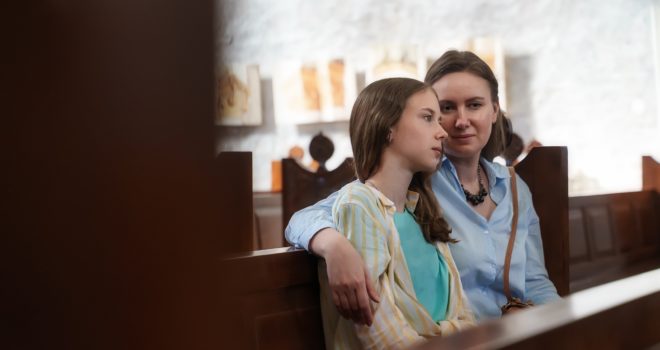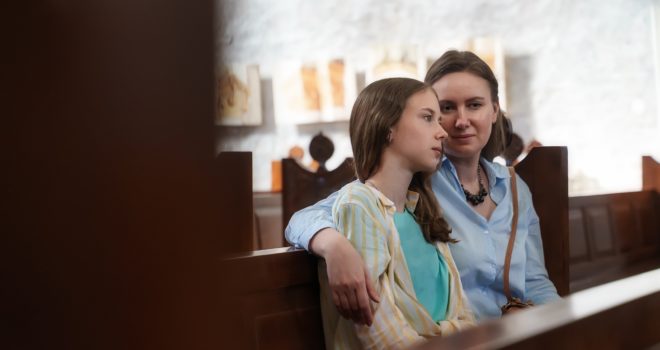We were in a drive-thru at a restaurant, when I heard my newly fluent reader pipe up from the backseat, “Mommy, what does ‘Happy Pride Month’ mean?” My children have met and know persons with same sex attraction, and also know a person who is transgender. I have not set out to “expose them to different lifestyles.” They are fairly sheltered. However, they are navigating the same world that all of us are, and topics around sexuality (which wouldn’t have been discussed publicly when I was growing up) appear in the most unexpected places while out in public.
I know from talking to other Catholic mothers, that I am not alone in navigating these conversations. My goal is always to balance presenting what our Catholic faith teaches about these topics (and all topics related to human sexuality) while also imparting compassion and love for those whose lives look different than our family’s. Here are three suggestions for how to approach these discussions from the perspective of our Catholic faith and charity.
Present Catholic Teaching from a Place of Beauty
To begin with, I have ongoing discussions with my children that lay the foundations for Catholic teachings on human sexuality. Rather than waiting until they are teens and then having “the talk,” I build up to that over the course of their childhoods. My approach to teaching them about their bodies, for example, leans heavily on Theology of the Body. I teach them that their bodies are good, and beautiful. I talk to them about their bodies from the perspective of “caring for” something that is good. For example, when I talk about eating in front of them, I don’t talk about being fat or food being bad. I talk to them about getting the nutrients that their bodies need, and the importance of getting the nourishment that your body needs.
But, as a mother of daughters, I also talk about the female body from the perspective of the amazing things it can do. I have carried four children in my body, and my midsection is softer than it used to be. When a young child of mine pats it and says, “Mommy! Why is your tummy so big?” I tell them, “It’s big because you grew in it, and so did your big siblings! God makes mommies have extra soft tummies, too, so their babies would have a place to rest after they’re born. When I look at my tummy, it reminds me of you!” My youngest child actually refers to my belly as “her first home.”
When we talk about gender, we don’t talk about stereotypes. We talk about the truth that our bodies point to. I explain to them that being a girl is not about wearing dresses, liking the color pink, or doing “girly things.” Being a girl/woman is about the capacity for motherhood. There is a place in their bodies that is designed to receive and grow and nurture human life. I explain to them that they might be called to be physical mothers someday – to grow and nurture a child in their wombs. But, even if they aren’t – if they are single or belong to a religious order or even if they are infertile – that part of their body still points to a spiritual capacity of their hearts, to receive and nurture others.
I don’t want this explanation to be construed as me saying that women should be barefoot and pregnant round the clock. Rather, they can harness this capacity in whatever path God leads them – from stay-at-home mom to CEO.
Likewise, there is a particular kind of strength and protection that is proper to men. All men are called to be fathers, to some degree – to use their strength to build up and protect others (especially those who cannot defend or care for themselves). Again, no matter what path God calls a man down, this particular kind of care is written on his heart and is reflected in a body that is brimming with testosterone and higher muscle mass and reproductive organs that give rather than receive.
I know that non-Catholics might read the above theological understanding of the body and roll their eyes or misunderstand it. But, regardless, these are the truths woven into our faith and our understanding of humanity through a Catholic lens.
Preparing My Children for Opposition
I know that not everyone who my children know and care about will agree with them about the Catholic views on marriage and human sexuality. So, when I discuss this with them, I keep that in mind.
I remind them that we can love and be friends and have family that believe things that are very different than our beliefs. Just because someone doesn’t agree with you does not mean that you can’t still love them. I went to a public high school, and I did have Catholic friends – but I also had a Jewish friend, Protestant friends, at least one friend who was openly homosexual, and a good friend who was an atheist. We shared our perspectives with each other, but we also respected that we could be friends even when we didn’t agree about everything. They knew that, at the end of the day, I believed strongly in my Catholic faith. I shared my faith with them, but I also didn’t despise them for not agreeing with me. I cared deeply about each of them. I don’t want to raise my daughters to be afraid of people who are different from them. Rather, I want to give them the skills to navigate those relationships in love.
So, as part of these conversations that I have with my daughters, I remind them that they can love people who don’t agree with them – but I also remind them that they don’t have to stop believing what they believe either.
When they are older, I will equip them with ways to articulate what they believe as Catholics. I will help them explain what our Catholic beliefs about sexuality are, and hopefully do so in a way that allows them to convey that disagreement does equal hatred. In the meantime, I have told them that if these kinds of topics come up, to simply say, “That sounds like a grown-up thing! Can we just play right now?” Sexuality is a grown-up thing, and it is okay for our children to stay innocent, especially before puberty.
Over All These Things Put on Love
I always conclude these conversations in the same way, though. I remind my daughters that if they see someone who looks or acts different than they are used to – such as someone who is transgender, a homosexual person, etc. – they just need to show them the same love and respect that they show any other child of God. For indeed, that is what they are. Rather than see someone who is “different,” they can see a brother or sister in Christ.
And one day, when they are old enough to talk about these heavy topics with others, they will find their Catholic beliefs better received when they speak from that place of charity. Indeed, if any of us are going to enter into dialogue with someone different from ourselves, we should focus less on winning an argument and more on speaking the truth in love.
✠












